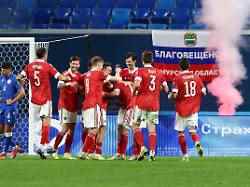With Kyrgyzstan as a “friend”
How Russia’s football sneaks into a stage
09/22/2022, 2:15 p.m
In fact, Russia has been wiped off the football map. National teams and clubs are banned by UEFA and FIFA. And yet the Sbornaja can play at the weekend. Because Kyrgyzstan and a gap in the system help.
The stadium in Bishkek is not exactly a jewel. The 23,000 seat shells have faded, the tartan track is showing its age, the floodlights are an old steel monster. And yet, on Saturday, the football world must take a sneak peek at the dilapidated arena in the Kyrgyz capital. After all, the national team of the Central Asian country agreed to play alongside the Russians.
The Russian association RFU describes the game as a “friendly match” on its website, with which the hosts of the 2018 World Cup finals want to report back on the international stage. In fact, it is the national team’s first game since the start of the Russian attack on Ukraine. A gap in the system is responsible for the fact that it is allowed to take place at all.
Because although Russian national teams and clubs were banned by the European Football Union (UEFA) in February with the support of the Court of Arbitration for Sport CAS and the world association FIFA issued a World Cup ban, bilaterally agreed test matches are not covered by this regulation. The associations do not see themselves as responsible for this.
Interior Minister advocates exclusion
The Russians are happy about that. Because by playing against the 95th in the world rankings, they can pretend that they are returning to a kind of normality. According to critics, it is being made too easy for the Russians and their remaining friends anyway.
This is also shown by the recent decision of the UEFA Executive Committee, in which, by the way, the Russian Alexander Dyukov still sits. The Exko announced on Tuesday that Russia would not be allowed to take part in the draw for qualifying for the 2024 European Championships in Germany – Belarus, on the other hand, will take part in the drawing of the groups on October 9th in Frankfurt/Main.
This approach met with a lack of understanding from the federal government. In a letter to UEFA President Aleksander Ceferin, Interior Minister Nancy Faeser had called for a ban on Belarus before the Exko meeting. Faeser demanded in vain that “Belarus, as a key supporter of the Russian leadership, should also be excluded from all international soccer games and tournaments.”
Zelenskyj also appealed
Ceferin received another letter with a prominent sender on Tuesday. Ukrainian President Volodymyr Zelenskyy wrote after speaking to the UEFA boss on the phone the day before about the federation’s help in releasing captured Ukrainian athletes. In his letter, Selenskyj thanks UEFA – among other things for the exclusion of the Russians and the end of cooperation with former sponsor Gazprom.
But there are other voices coming from Ukraine at the moment. Those who cannot understand how World Cup participants Iran have agreed to play a friendly against the Russians in November. The Ukrainian public is even more incredulous about Bosnia-Herzegovina. After all, shortly before the World Cup in St. Petersburg, there will be a game between Russia and the Balkan country. The Ukrainian idol Andrei Shevchenko has already called on the Bosnians to boycott.
It remains to be seen whether the appeal works. In any case, there will be a game in Kyrgyzstan on Saturday – and the world must take a look.
